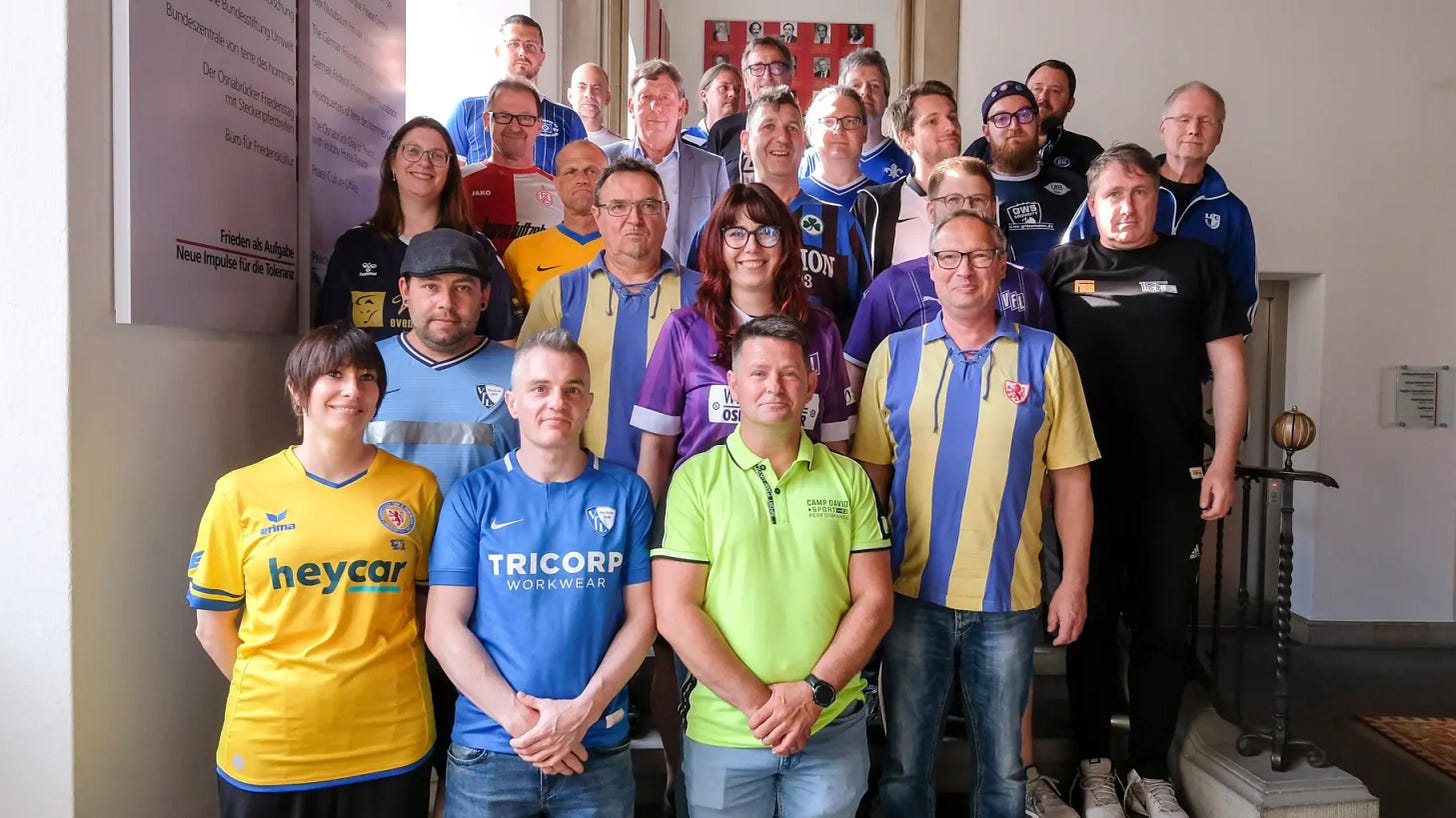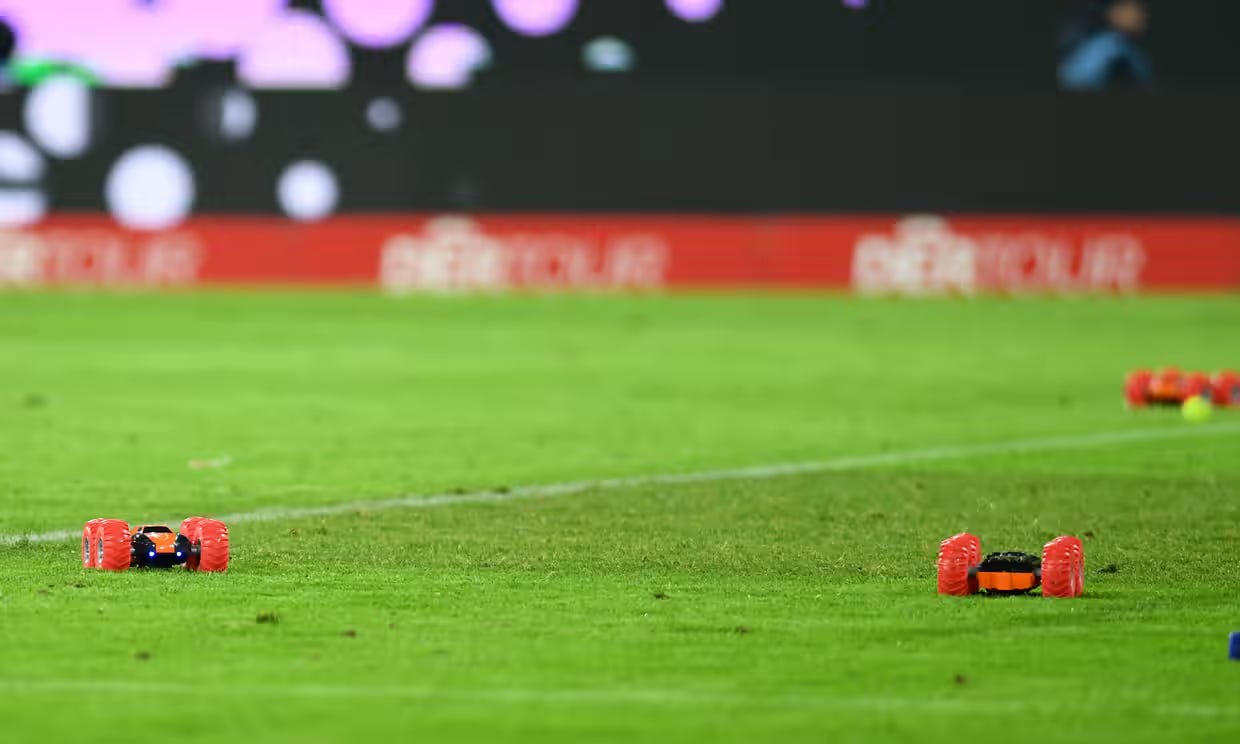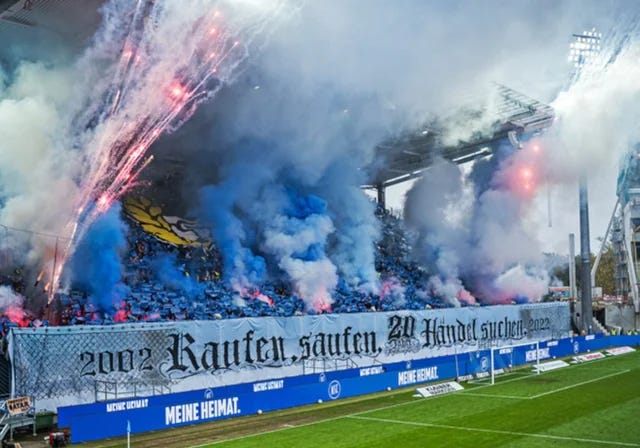‘Our Stands’ — Inside Unsere Kurve’s advocacy for football fans
Affordable tickets. Sensible pyro policy. Greater data protection for fans. Most matchgoing fans in Germany would agree with these core demands. Who is representing them in this struggle?
If you could make a list of demands to the football-powers-that-be, what would you request? For me, an immediate cessation of all ‘Football Youtube Podcasts’ (you know the type) related activity would be a brilliant, if entirely unactionable, place to start.
Stupid suggestions aside, I think match going fans from across the globe would agree on something that looks like this:
No more business as usual with VAR
Legalise pyrotechnics and reform the associated penalty/fine system
Earlier scheduling of games
More affordable tickets, with a cap on prices for away fans
Greater respect for data protection and a stop on ‘control mania’ i.e. higher scrutiny on the data that is shared between clubs and the authorities
This list, published at the start of the 2024/25 season, is the work of Unsere Kurve (trans: Our Stand) an association representing football fan groups across Germany. Originally organising itself as a loose collection of like minded collectives, the organisation officially registered as an ‘eingetragener Verein’ in 2021 after the Covid-19 pandemic brought a renewed sense of urgency.
The interests of fans in Germany are closely aligned according to Jost Peter and Kristina Schröder, Unsere Kurve’s first and second chair. They explain the organisation's constituents are made up of representatives from clubs as big as Bayern Munich, but they also have members from the third tier and the Regionalliga. Peter, a Rot-Weiß Essen fan, and Schröder, an Arminia Bielefeld diehard, explain the interests of German matchgoing fans can broadly be defined as ‘anti-commercialisation’.
“As fans of Bielefeld or Essen, we may not have all of the same problem as a Bayern fan,” says Schröder. “The tickets are more expensive for away fans in the Champions League, but we also want to see a cap for travelling fans when they visit somewhere like Essen.
“We have similar interests and problems with regards to fan culture. We have the questions of politics, representing the interests of the fans, and prices. It doesn’t matter if I support a club in the third league, or the Bundesliga, I want the Police to treat fans fairly, for example.”
“We’re against commercialisation. It’s a horrible word. Yes there are differences between groups of fans, but the general and main focus is we all want football which is more for the fans. For the supporters. It’s not only about making money.”
On its website, Unsere Kurve explains its philosophy. They believe, “football brings people together, connects them, and is a fundamental social space. We see football as a spectator sport. This means fans are a part of football, and never just an accessory.”
In order to uphold those ideals, representatives of each constituent membership group are in constant communication, both through digital forums and biannual meetups. From there, leadership enters into dialogue with fan outreach officers at governing bodies such as the DFB or the DFL (the organisation which runs the Bundesliga). Since officially organising this effort has become more collaborative.
“The dialogue is growing. It’s coming out of the initiative of fans, organised fans,” he explains. “The DFB itself wouldn’t have done this structure if it hadn’t been for the growing influence of fan discussion forums.”
Sometimes fans need to explore alternative methods of making their voices heard, however. In February of this year demonstrations against a proposed plan to sell a €1bn share of the Bundesliga was halted following the protests of fans. Tennis balls were thrown onto pitches, toy cars driven across the grass, banners held up on the terraces. When the DFL reneged on the deal, Unsere Kurve’s celebratory statement read:
“Ultimately the key to this success were these comprehensive, and very peaceful and creative protests.”
Peter explains that Unsere Kurve also maintains close working relations with other fan-led lobbyists, both in Germany and across Europe. This includes working with groups that aim to promote greater inclusion in the game, such as Netzwerk F_in — a group that promotes the rights and interest of female fans — and Queer Football Fanclubs. Proper representation for all is a core principle for Unsere Kurve. Recent political developments and questions of German patriotism surrounding the European Championships has again reignited debates around racism and the sport.
“We are anti-fascist,” says Peter. “We are anti-racist. We are anti-sexism. We can't work with people who hold such an ideology.
“That comes out of the best of fan culture, it’s not our personal politics. It’s about the atmosphere we want to bring to the stadium. An agreement has to be made between the fans to say, ‘I want a loud colourful experience, I have to behave in this way.’”
As a member of Football Supporter’s Europe, Unsere Kurve is keenly aware of the governance issues in other countries. Peter refers back to a recent conference he attended in the UK. Ownership models was the topic du jour for the English clubs in attendance, many of whom were advocating for a German approach. Unsere Kurve supports the maintenance and expansion of the ‘50+1’ rule. Peter, who began the call telling me of Rot-Weiß’ lone European adventure, a 4-0 drubbing at the hands of Hibernian in 1955, laments the path that British football has taken in recent years.
“In Britain, you saw a lot of fan groups being marginalised or thrown out of the stadium’” he says. “We have a very, very strong Ultra movement, who can act on the interests of fans. Without this organisation in countries like Britain, you have less of a voice. Who can afford the prices we’re seeing in the Premier League?”
That’s not to say prices in Germany are uniformly cheap. The Bundesletter has seen this first hand; when securing tickets for our recent trip to Rostock, we saw tickets going for €53, a staggering price for a third division game. Meanwhile, a standing ticket at Union Berlin can be as cheap as €15 for members.
A study by DW found the prices of tickets varied greatly across the top two divisions. RB Leipzig charged the highest price for an individual fixture. For the luxury of watching Bayern Munich or Borussia Dortmund, home fans would have to part with €90. If football is for all, how can the less fortunate or younger fans get a foothold in the game?
“For us, it’s just important that everyone has the chance to attend a soccer game,” says Schröder. “For a family with two children, and two adults, you have to spend a lot of money when you factor in food, drink and travel.
“When a child is costing almost as much as an adult? To us that’s unacceptable. For people who are less fortunate, or maybe have a disability, shouldn’t we help these people? We wanted to put this issue back in the minds of the people.”
Other issues around policing and fan behaviour are very much front of mind. In September, the Karlsruhe District Court sentenced two KSC Ultras to one year and two months in prison respectively for organising a “pyrotechnics event” that left several injured. In October, three employees from KSC’s fan project were fined for their role in the display. It has brought back debates around the use of flares and fireworks in German stadia. There is currently a complete ban on the use of pyrotechnics at football matches, not that it stops fans from whipping them out regularly. Peter believes some leniency must be afforded to fans in this instance, as the beauty of football fandom relies on the ability to push usual barriers of accepted behaviour.
“Sometimes football fans behave not completely in line with the law,” he says. “Maybe you bring a pyrotechnic. Maybe you say something which isn’t entirely politically correct. To be in a stadium is maybe to be one step over the border of normal behaviour. That is an ongoing discussion.”
He believes it demonstrates a wider issue within the game. That German Police forces expect the worst from football fans leading them to heavy-handed tactics as a starting point, rather than a last resort.
“Many feel German police start with the position that every football fan is a criminal. They behave like this at the games. They are coming dressed for a civil war.”
Both Schröder and Peter are worried about the over-collection of data around football. They both cite the “Datei Gewalttáter Sport” — a database introduced in 1994 that records the details of violent criminal activity around sporting events — as an overreach on football fans' civil liberties.
“With this data, they are becoming like Facebook, but without the free will of the pen,” says Peter. “You're not subscribing for a service. They can take what they want, and they take everything they can get, even without standing on the basis of civil law.”
In October of this year, a court found the database did not show ‘an appropriate storage threshold and sufficient specifications for the storage period’. Essentially the storage of data in some instances neither met the definition of violent criminal behaviour nor was it deemed necessary to hold information for extended periods of time. For example, a Werder Bremen fan’s details remained on record since 2010. His crime? Tagging a bus with a magic marker.
Since the Covid-19 pandemic most clubs have digitised their processes, issuing e-tickets rather than physical cards. This has increased anxiety for matchgoing fans, already weary of how their information is weaponised against them.
“It seems like a small thing, but too much information is collected by the clubs,” she says. “Sometimes you need an app that can sometimes be printed on a paper ticket where anyone can read it.
“This transfer of data doesn’t happen at other ‘German’ events. Let’s use Oktoberfest as an example. You don’t need to give all this information, you don’t have a huge Police presence.”
Underpinning this fight is a sense that there is something worth protecting. It's not lost on Peter that German football culture is the envy of other powerhouse nations in Europe.
“Besides all its problems, German football is authentic. It’s original. You go to the terrace, you drink your beer, you singalong. You make a huge party, and after the city is all about football.
“Everyone wants to go to football. To have these moments. That’s what we are fighting for. For football fans to have this space in the future.”








A great read as always Thom, German football really is the envy of football fans in the UK.
May I perhaps propose a 6th amendment to your list?;
6. If you reside in the country of the league you follow, all games of the major league should be available for viewing at a reasonable cost, say a monthly fee capped at £50 p/month.
Latest figures for prem viewers show a cost of £1270 p/year / £105 p/month (£158 if you only count the typical 8 month season) across all necessary subscriptions and you can't even watch roughly 110/380 of the games.
For example in Australia, all PL & CL games are available for around £40 p/month where a viewer is roughly 10,500 miles away from the action...
An idealist view of which I see no route to ever happening yet we can all hope right?
€53 at Hansa Rostock is crazy